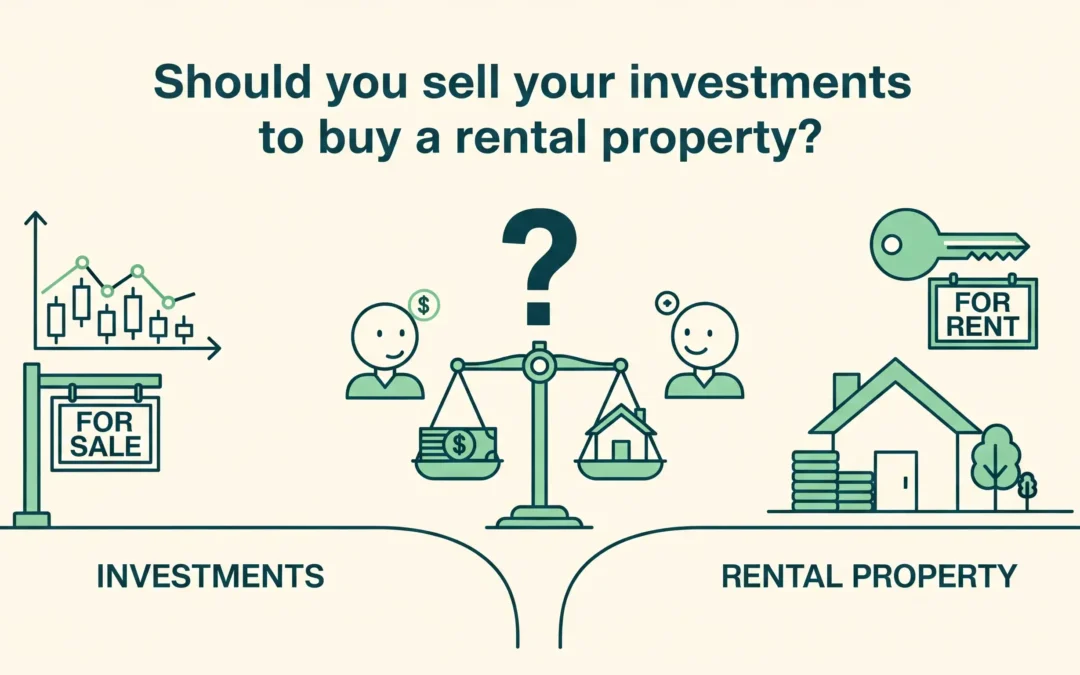Did you ever think of selling your investment to buy a rental property and book regular income monthly? If yes, then what is the right age for it? This is a huge step to take as it can impact your finances to a great extent. Personal research and profile analysis are required to make a conscious decision.
This article will help you compare returns in both cases, analyse the important factors, and give you an idea of whether you should do it or not.
Comparing the Returns of Market and Real Estate Investments
Before you redeem your money from an investment to buy a rental property, it is important to compare returns. Both have the potential to produce wealth over time, but they do so in quite different ways, and the results vary depending on a number of variables, including location, market cycle, and individual risk tolerance.
Let’s compare the two asset classes to analyse this:
| Parameter | Stock Market Investments | Rental Property (Real Estate) |
| Average Return (Annually) | Long-term returns for Nifty/Sensex average around 10–12% per year, but actual results fluctuate depending on market conditions. | Typical rental yields are about 2–3% yearly; total returns with appreciation usually add up to 6–9% per year and can be much lower in some areas. |
| Risk | Market volatility, but it can be diversified | Location-specific, tenant-related, illiquid |
| Liquidity | High – Easy to buy/sell stocks, mutual funds | Low – Property takes time to sell or rent out |
| Effort Required | Minimal – mostly passive (unless trading actively) | High – property management, tenant handling |
| Cash Flow | Dividend yields (2–3% max) + capital gains | Regular monthly rent income + long-term growth |
| Tax Implication | LTCG, STCG, dividend tax | Property tax, rental income tax, and stamp duty |
Things to Consider Before Selling Investments
Consider the following carefully before rushing to sell your portfolio for a rental property:
1. Lack of Diversification
Your financial risk may rise if you move all of your funds from a diverse portfolio to a single rental property. The secret behind a good portfolio is diversification. It protects the capital even if one sector is not performing well, as the other sector compensates for it.
2. Ownership Cost
In contrast to paper investments, real estate has:
- Fees for registration
- Stamp duty (typically 5–7% of property value)
- Maintenance fees
- Repair and upkeep costs
These costs are in addition to the huge amount required for buying the property.
3. Effort and Time
Being a landlord isn’t always a passive job. Your return may be impacted by handling tenants, repairs, or vacant periods. The returns can get lower, and your reputation may also be affected if the tenants are not getting the services as mentioned. Addressing their complaints is important and hence requires time and effort.
When Selling Your Investment Makes Sense
Sell if:
- You have established a solid financial base: Investing in real estate is less hazardous if your emergency fund and retirement savings are still intact.
- The property is situated in an area with strong rental demand: Places with stable rental demand can guarantee higher occupancy and consistent monthly income.
- The property can be managed or outsourced: Rental ownership is made simpler if you can afford a property manager or are at ease managing tenants.
- You intend to keep the property for a long time: Real estate appreciates slowly, so holding it for years can maximize capital gains and rental yield.
Don’t Sell If:
- You’re leaving high-growth investments too soon: Long-term wealth creation may be reduced if stocks with compounding potential are sold.
- You’ll have inadequate liquidity after this: Your ability to manage financial emergencies may be hampered if you have money tied up in real estate.
- Your objectives are ambiguous or short-term: Due to its lack of liquidity, real estate might not be suitable for sudden changes in one’s circumstances or financial needs.
- Your portfolio outperforms the rental income: The move might not be worth it if real estate returns don’t outpace your present investment gains.
Bottomline
The conclusion can be drawn that selling off your investment to buy a rental property is a big decision. The individual must acknowledge the drawbacks, like lack of liquidity, high initial cost, requirement of time and effort, maintenance and repair service, and lack of diversification. Even after knowing all these, if the person sees potential in real estate, then it may be a good option for them.
However, it is important to note that doing it at an early age takes away the chance of earning more through aggressive funds and may slow the process of wealth building.


